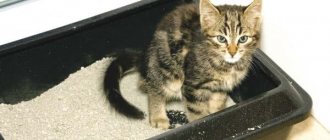If a cat hisses at a kitten or person and snorts, then in a similar way the pet may be showing aggression or fear. A cat getting angry and rushing when defending its own territory, or aggressive behavior towards its owner may be a sign of resentment. This condition in an animal should not be left unattended, since hissing is often one of the symptoms of a serious illness. Therefore, as soon as the cat becomes aggressive and starts hissing, it is recommended to contact a veterinary clinic.
The hiss of a cat defending territory
Cats are by nature solitary animals who value their independence.
In the house where he grew up, the cat feels like a master. When another animal appears in the home, especially a dog or kitten, the animal jealously defends its place in the house. This continues until a hierarchy is established. It is not uncommon for a four-legged animal to take out its irritation on its owner, and not on its competitor. The animal in such a situation is aggressive, this is indicated by hissing and often beating its tail. Aggression in a cat can be caused by the smell of another animal brought from the street. A change of housing can also cause his aggressiveness, as it disrupts the usual way of life. Situations are possible when a cat defines itself as the leader in the house, then it zealously defends its position through intimidation. He hisses and shows aggression in all possible forms whenever he touches objects that he considers his own or decides that there is an invasion of his territory. In such situations, the cat often attacks people.
What you need to know
- The most serious reason for hissing is pain . Which the cat experiences. It is important to exclude the possibility of pain and the pet.
- Also, hissing becomes a manifestation of aggressiveness during rabies. This is an even more serious reason not to provoke the animal, and to immediately contact a specialist with the problem.
- The owner of the cat or the cat will hiss if he showed anger or aggressiveness towards the pet. The cat will not forget that the person beat her and shouted loudly at her.
In most cases, hissing is not a dangerous phenomenon; you just need to find out its nature and cause.
Common Causes
If you figure out why your pet shows negative emotions, you can avoid conflict and even traumatic situations.
Defense: self, cubs or territory
Not only dogs, but also cute fluffies are able to protect themselves, kittens or their territory from surrounding people or animals. The adult feels like the owner of the home, and therefore experiences irritation if someone wants to encroach on it.
The furry friend will use terrifying sounds to drive uninvited guests out of his territory. Mothers are especially active, who in this way try to drive the stranger away from the nest with kittens.
Manifestation of fear
Specific sounds can be caused by certain fears of the cat, which are usually associated with insufficient socialization or regular physical punishment. The fact that deviations in behavior are provoked by a feeling of fear is indicated by warning poses (standing sideways, half-turned), attempts to inflict injury with claws, and subsequent demonstrative licking of the fur.
A pet may hiss at a vacuum cleaner, at loud guests, or at an unexpected sound or touch. Fright is often accompanied by a fluffy tail.
Aggression
Sometimes a cat's hissing is explained by an aggressive attitude aimed at a specific person or animal with which negative memories are associated. For example, a guest could step on a tail, paw, or offend during a previous visit. Or the neighbor's dog is constantly trying to catch up and sniff the mustache.
The owner himself is capable of provoking aggression. Sharp shouts, frightening gestures or trips to the vet are good enough reasons for a mustachioed friend to hiss. If a pet has not experienced tenderness and affection from a person since childhood, then he will begin to scream and hiss at him during any attempts to get closer.
Unmotivated aggression is often caused by sexual desire or hormonal imbalance. If a cat hisses at everything for no reason or reason, it is better to take him to the vet and have him neutered. The same applies to females.
Illness or state of anesthesia
If a gentle and affectionate purr begins to demonstrate repeated aggressive behavior, this may indicate the presence of health problems. Among the diseases that accompany inadequate reactions are:
- food and chemical poisoning;
- epilepsy;
- toxoplasmosis;
- hormonal disbalance;
- rabies.
An injured animal, in pain, will hiss and growl at a person who wants to help. Operated pets who have not fully recovered from anesthesia and have lost the ability to navigate in space react the same way.
Trying to communicate something
Sometimes a cat is forced to hiss to attract the owner's attention. This happens after a mustachioed friend called out to a person by meowing repeatedly, but he did not respond.
In this case, the fluffy feels displeased and makes frightening sounds.
This behavior is most often demonstrated by poorly raised or overly spoiled pets. If the mustache constantly behaves this way, then measures must be taken to re-educate it.
Signs
Typically, a cat hisses when it is afraid of other animals or people. But traditionally it is believed that in this way she shows aggression, she can even rush and attack.
When an animal makes such sounds, it becomes tense, bends its back, tail, and may press its ears. What does a hissing cat usually look like?
- His fur instantly stops being tousled, it seems that it has turned from smooth to fluffy, voluminous. Visually, the cat even looks larger at such a moment.
- When a cat gets angry, his back arches. This pose is a signal that the animal can and will rush at the offender or someone who, in his opinion, poses a danger.
- The ears are flattened for a reason. They talk about distrust of those around them. It is also a kind of protection for the head from injury.
- An expressive look conveys all the emotions of a cat - courage, aggressiveness, determination. Meowing may also be heard along with the hissing, but it does not make the disheveled cat any cuter. On the contrary, the sounds complement the appearance and confirm the readiness to stand up for oneself and even rush at a person.
The owner of the animal, having studied its habits, will be able to figure out when a cat hisses because of a sense of danger, and when because of a feeling of aggression.
The cat is in pain or preparing for it
If a furry pet hisses at the owner for no reason, then there is a possibility that the cat is sick. Or maybe something is really bothering him, because it’s difficult to explain why a cat hisses for no reason. A meowing friend may have a number of medical conditions that cause irritation, for example:
- epilepsy;
- severe poisoning;
- hormonal changes occur in the cat’s body;
- the cat was injured;
- the animal has developed toxoplasmosis or another disease.
When an animal is sick, it is afraid of a person, it hurts from the owner’s touch. It does not want to be bothered and is afraid that the owner will cause pain without wanting it.
Mature kittens
Cats are very sensitive not only about territory, but also jealously protect their offspring. If a mother is aggressive towards her kittens, there is a good reason for this:
- She might be sick. There is no milk. The kittens are already teething and they are causing her pain. The kitten is weak, not viable, she does not allow him to have a pacifier so that there is more milk for the rest.
Cats sometimes nurse kittens for up to a year, but most often the maternal instinct lasts for up to six months. After which the mother refuses to feed them, showing that they have already grown up enough and it’s time to cope on their own. You notice that the cat has begun to hiss at her kittens.
At this moment, the babies must be given to another owner. If you want to keep one of them for yourself, you need to monitor the behavior of your pets, since the mother, emphasizing her primacy in the hierarchy, may be aggressive towards the baby. In this situation, she will not only hiss at the kitten; more aggressive actions are also possible. After a couple of weeks, the cat will calm down, take a position and stop hissing at the kitten.
How to calm a cat
You can calm a cat that is actively aggressive towards you in the following ways so that it does not cause you harm:
- put on protective clothing and take the animal in your arms, quickly wrap it in a blanket;
- Always have a water spray with you so that in case of aggressive behavior you can spray a little water in the direction of the animal. This way you will protect yourself from possible consequences;
- Do not tease or provoke the animal if you see impending aggression or after the first attack attempt.
Also, to curb the harsh behavior of the animal, the following actions should be taken:
step away from the cat, you may need to leave the room for at least 10 minutes so that he “burns out”; if the cause of aggression is another cat or animal, then they should be isolated from each other for a while and introduced gradually; sit and do not look into the cat's eyes during the period of irritation, this will only increase its fear. You can lie down on the floor. This will make you appear shorter to the cat and this will calm her down; do not pay attention to the cat for a while so that he understands that you do not pose any threat to him; make hiding places for the cat - sometimes staying in a safe shelter for a while helps calm the animal’s negativity
If the cat is scared and has nowhere to run, the aggression will only intensify; approach the cat slowly and carefully, avoiding touching; or let him come to you himself, so that the cat can be convinced that you are open to communication and do not want to hurt him. Let him sniff you, rub his head, so the animal will quickly understand that you are not as scary as he thinks; feed the cat or give it water; do not resort to punishment, otherwise attacks of aggression will be more frequent.
What should an owner do in response to cat aggression?
If the owner is tired of constant attacks from the pet, then it is necessary to start raising him. The owner must do everything possible to prevent the cat from having the desire to rush at the child or strangers.
scold
The cat is drooling: the main causes and treatment options
You should not scold a cat when it tries to attack its owner. The cat's disposition is such that these animals can remember insults inflicted on them.
The best way is not to scold, but simply to ignore. This means not responding completely to the behavior, even with words. Only then will the cat understand the reason for such an attitude of the owner.
Re-educate
When retraining your pet, the following recommendations should be followed:
- do not play with the cat with your hands and feet;
- buy only those toys that allow you to play at a distance with the owner (fishing rods, candy wrappers on a string);
- If a cat grabs your hand, do not suddenly pull it out. In such a situation, she will become even more angry and will only intensify her aggression. You should freeze for a while, wait until the pet releases your hand, and then stop playing. In this way, the cat will understand that aggressive behavior is a reason to end the game and communicate with the owner;
- in order for the kitten to grow up calm, you should devote more time, love and affection to it;
- During the training process, you should be patient with the animal and not beat it. Education must be accompanied by patience on the part of the owner. The animal should be helped to recognize the bad behavior.
Important! A pet should be trained and raised from the first days of its arrival in the home. Only in this case will the process be effective.
You should raise your pet properly
Showing you care
Showing care, affection and love is an important rule in the fight against a cat’s desire to attack its owner. Among the manifestations of concern are:
- you should pet your pet;
- speak kind words to him more often;
- pet the animal;
- pamper with treats;
- play.
Other methods and recommendations
General recommendations on how to stop a cat from rushing at its owner include:
- Suitable toys should be provided for the cat that allow it to exercise its hunter instinct and pounce on its “prey”;
- a special board or pillow should be offered for scratching and “beating”;
- You should spray your cat with water every time he bites or does something unacceptable;
- if possible, take another animal so that it doesn’t get boring;
- in some cases, the cat is castrated, which sharply reduces its aggression;
- You should explain to your child how to play with your pet correctly so that it does not get angry or attack.
Common Causes
If you figure out why your pet shows negative emotions, you can avoid conflict and even traumatic situations.
Defense: self, cubs or territory
Not only dogs, but also cute fluffies are able to protect themselves, kittens or their territory from surrounding people or animals. The adult feels like the owner of the home, and therefore experiences irritation if someone wants to encroach on it.
The furry friend will use terrifying sounds to drive uninvited guests out of his territory. Mothers are especially active, who in this way try to drive the stranger away from the nest with kittens.
Manifestation of fear
Specific sounds can be caused by certain fears of the cat, which are usually associated with insufficient socialization or regular physical punishment. The fact that deviations in behavior are provoked by a feeling of fear is indicated by warning poses (standing sideways, half-turned), attempts to inflict injury with claws, and subsequent demonstrative licking of the fur.
A pet may hiss at a vacuum cleaner, at loud guests, or at an unexpected sound or touch. Fright is often accompanied by a fluffy tail.
Aggression
Sometimes a cat's hissing is explained by an aggressive attitude aimed at a specific person or animal with which negative memories are associated. For example, a guest could step on a tail, paw, or offend during a previous visit. Or the neighbor's dog is constantly trying to catch up and sniff the mustache.
The owner himself is capable of provoking aggression. Sharp shouts, frightening gestures or trips to the vet are good enough reasons for a mustachioed friend to hiss. If a pet has not experienced tenderness and affection from a person since childhood, then he will begin to scream and hiss at him during any attempts to get closer.
Unmotivated aggression is often caused by sexual desire or hormonal imbalance. If a cat hisses at everything for no reason or reason, it is better to take him to the vet and have him neutered. The same applies to females.
Illness or state of anesthesia
If a gentle and affectionate purr begins to demonstrate repeated aggressive behavior, this may indicate the presence of health problems. Among the diseases that accompany inadequate reactions are:
- food and chemical poisoning;
- epilepsy;
- toxoplasmosis;
- hormonal disbalance;
- rabies.
An injured animal, in pain, will hiss and growl at a person who wants to help. Operated pets who have not fully recovered from anesthesia and have lost the ability to navigate in space react the same way.
Trying to communicate something
Sometimes a cat is forced to hiss to attract the owner's attention. This happens after a mustachioed friend called out to a person by meowing repeatedly, but he did not respond.
In this case, the fluffy feels displeased and makes frightening sounds.
This behavior is most often demonstrated by poorly raised or overly spoiled pets. If the mustache constantly behaves this way, then measures must be taken to re-educate it.
Reasons for warnings
- Fear. Cats are nervous creatures; a feeling of fear can arise in them for any reason: a change in their usual environment, unfamiliar people, unpleasant odors, painful sensations, aggressive behavior of people or other animals.
- Pain. Cats tolerate many injuries and illnesses better than people; their immune system is formed in such a way that sometimes they do not need medical intervention. However, any illness is an unpleasant sensation. At such moments, the animal only needs peace to gather strength and overcome the disease. And in response to any intervention, the cat “asks” not to disturb it. Such conditions can occur not only due to diseases: animals in heat do not always control their emotions, and females often need solitude during childbirth and pregnancy.
- Intraspecific relationships.
- The warning system exists to clarify relations between fellow tribesmen. And the hissing in this case is also translated as a warning, for example, when dividing territory. Females use this method of warning if they do not intend to mate or if they are protecting their cubs.
- Impending attack. Cats are not prone to sudden attacks unless they are hunting. Any physical aggression begins with a warning: often showdowns end at this stage if the enemy is not ready for battle.
How to understand a pet
To understand your pet, you need to love it and watch it. And then it won’t be difficult to translate her hissing into human language.
If a cat has huddled in a corner, hisses, and has its ears flattened, it is most likely scared. The animal is looking for a safe corner where it can hide. The fear will go away on its own, you need to leave the pet alone. Excessive attention can cause even greater panic, and then aggression.
Is the cat in a high stance, holding one paw raised and hissing, are its ears not flattened? This is a signal that the cat is now going to attack the one he has chosen as the target of the attack. It's better to move away from him.
A cat's hiss can be difficult to explain. There is no danger, the owner strokes his pet, and in response there is hissing and aggression. What should you think about? Perhaps the animal is sick, and touching or stroking causes even greater pain. Alternatively, the cat is in a bad mood, she is tired, and human attention seems intrusive to her.
What can confirm the presence of the disease? This is apathy, lack of appetite, change in normal behavior. You shouldn’t wait to see how it all ends; it’s not difficult to take your pet to the veterinary clinic to find out the problem.
Leadership in the cat family
When kittens switch to adult food and learn to defend themselves, they become independent and enter adulthood.
During this period, they cease to be cat children and become competitors for the attention of their owners, for the best tidbit, for territory. Hierarchy is very important in cats
When kittens switch to adult food, they become independent and enter adulthood.
By hissing, biting, and persecuting, the older cat asserts its dominance, the right to territory and the care of its owners.
At this age, it’s time to separate the cat and kittens and find a new home for the kittens. In special cases, you can try to endure and let them figure out for themselves who will be at what social level and themselves obey the subsequent rules established by the animals.
Why do cats growl and hiss?
Predators direct their main forces to obtaining food and hunting. They are in no hurry to fight with the enemy, defending their territory, so when they meet, they first warn him of their indignation by hissing or growling. For most hissing animals, this sound is simply a warning. Sometimes it plays the role of a battle cry.
There is no beast more terrible than a cat: hissing and growling as a threat
Hissing, the cat bares its teeth and presses its ears to its head, acquiring a menacing appearance. Her fur stands up, her fangs are exposed, her claws extend. At this moment, it becomes clear to the enemy that the animal is ready to attack. With its entire appearance, it shows that it does not intend to joke, and lets the opponent know that he still has a chance to leave the territory.
Representatives of the cat family are skilled, dexterous predators. In a battle with an enemy, they can seriously injure or even kill an opponent. They express their serious mood for a fight with warning sounds - growls and hisses. If a hissing cat is ignored, it may attack.
Masking fear
Why does it happen that cats hiss but do not attack? An animal's aggressive behavior towards certain people may indicate its fear. Perhaps he has some unpleasant memories associated with them
If in the past a house guest inadvertently stepped on a kitten’s paw or tail, you should not be surprised that the pet then arches its back and bares its teeth at its mere approach.
Common Causes
A cat hisses at a person in situations when it is trying to convey to him its experiences and emotions. Unlike people, cats are able to express their mood solely through body language, as well as vocal vibrations.
If an animal is constantly unhappy and, at every opportunity, tries to hiss and growl not only at a stranger, but also at the owner, it is important to find out the reasons for this behavior
Predator instinct
An aggressive and hissing cat can even awaken to an affectionate, gentle purr, because in any breed of cat the blood of predators flows - the distant ancestors of domestic cats. If the owner begins to remind the pet every day about hunting reflexes, you should not be surprised that the animal will snort, arch its back, and rush at a potential hunting object at every opportunity.
A true predator lives in a pet if the following habits are observed every day:
- Hunting and jumping on the owner's legs from ambush;
- Lack of reaction to loud remarks, increased pressure;
- Constant aggression, attempts to bite and scratch painfully.
Social aggression
Aggressive behavior is the result of excessive annoyingness and persistence of the owner. Every cat will want to let a person get close if it is in a bad mood or if the animal does not need affection at the moment
If a cat wants to communicate, he will independently approach the person, trying to make him pay attention to him
Wanting communication, the purr will rub against your legs, ask for affection, offer its back to be stroked, or even jump into your arms. But if the owner overdoes it with affection, the cat will turn from a kind, gentle pet into a real devil.
Therefore, it is important to try to find mutual understanding and not test each other’s patience
Redirected aggression
This behavior is typical of cats that are frightened or angry by something in the presence of another person. Cats have excellent associative memory, so if a stranger or owner became unwitting accomplices of an unpleasant incident, when they meet, they will always evoke negative memories in the mustachioed cat, becoming the cause of aggression.
It's no wonder cats react so aggressively towards some people. Just by appearing, an uninvited guest causes unmotivated anger, manifested by hissing, growling, and snorting.
Fear
A cat's hissing and growling may be due to fears caused by insufficient socialization, or even worse - physical punishment. If the hissing is caused by fear, this will be indicated by the following factors:
- An attack on a person in the presence of a specific stimulus;
- Growling, attempts to mutilate with claws;
- Increased snorting and growling if the animal is cornered;
- Adopting aggressive warning postures;
- Final demonstrative licking of fur.
Resentment
Most often, resentment accompanies a feeling of fear, but sometimes it occurs on its own
If your pet hisses, growls, or twitches its tail when meeting a person, it is important to find out the reasons. Cats usually ignore the person who offended them or try to show aggression openly
To make peace with your pet, you should communicate, apologize, and be sure to treat him with a treat as a sign of reconciliation and recognition of the mistake.
Growling, purring, hissing and meowing are the only sounds that cats use to indicate their mood. When figuring out why a cat growls and hisses, we must not forget about its wild origin.
Aggressiveness from fear
It happens when a cat that is quite friendly with others hisses at a certain person. This behavior is most often explained by fear and unpleasant memories of the first contact with him. For example, he inadvertently stepped on an animal’s paw or scared it in some other way. Perhaps this person is deliberately intimidating the four-legged animal, depriving it of the opportunity to retreat, trying to forcibly touch or pick it up. The cat perceives such actions as a direct threat, so it reacts aggressively - hissing.
The animal remembers once experienced stress for a long time. But the problem is easily eliminated with the help of kind words and favorite treats. The hissing of a pet can also be intuitive . If he was not handled as a child and had no human contact, the cat will probably be afraid of people as an adult. Even tamed cats can hiss at a person who is suspicious to them. That is, they proactively try to eliminate potential danger. That's why the cat hisses at strangers.
When strangers appear in the house, it is recommended to give the cat a treat, then he will associate such an event with pleasant experiences and will not hiss.
© shutterstock
A pet may be frightened or wary of an unfamiliar noise that we have never heard, but it has excellent hearing. (He hears any rustling under the floor or behind the wall.) The cat hisses when he sees danger in a variety of situations :
- careless gesture of the owner;
- visiting a veterinarian;
- the appearance of an unfamiliar person or animal;
- strong sound or scream, etc.
When a cat hisses at its owner, there is no need to put pressure on him. – Do not pick him up or stroke him forcibly. Let him calm down first. However, this hissing is not necessarily an expression of aggressiveness; perhaps a frightened animal wants to be calmed down. Sometimes a pet feels threatened for no apparent reason. In this case, you need to distract the cat and try to calm it down. If she doesn't stop hissing for a long time, you should take her to the vet.
If a cat has hearing problems, she is constantly alert and easily frightened by the sudden appearance or touch of a person. This may also be the reason for her aggressive state.
Leadership in the cat family
When kittens switch to adult food and learn to defend themselves, they become independent and enter adulthood.
During this period, they cease to be cat children and become competitors for the attention of their owners, for the best tidbit, for territory. Hierarchy is very important in cats
When kittens switch to adult food, they become independent and enter adulthood.
At this age, it’s time to separate the cat and kittens and find a new home for the kittens. In special cases, you can try to endure and let them figure out for themselves who will be at what social level and themselves obey the subsequent rules established by the animals.
Rabies
Although we mentioned in this article that the reasons for a cat attack can be fear or pain, it is worth looking at another reason for aggression: rabies.
Rabies is a fatal disease that can be transmitted from one animal to another. Once the virus reaches the brain, it begins to affect behavior. In many cases, one of the changes is increased aggressiveness.
In order to protect yourself and your animal from this pathology, do not forget about vaccinating your pets, and also do not let your purrs walk on the street, where they can be bitten by a rabid animal.
If you notice that an unvaccinated cat that has free access to the outdoors or is in contact with animals that walk outside becomes very aggressive for no apparent reason, contact your veterinarian immediately!
The animal is afraid
Cats are easily frightened. The reason may be a trip to the veterinarian, visiting guests, or loud noise. Sometimes it seems that there are no visible reasons, and the animal has nothing to fear, but the cat often sees what is inaccessible to people.
She may be afraid of a person if he has once harmed her. Maybe he stepped on your cat's tail or tried to pick her up against her will.
In order for an animal to stop being afraid of something, associations need to be replaced, the cat must feel positive emotions. For example, when your friend comes to visit, who has long offended your cat, treat her to delicious food and pet her.
When do cats hiss?
Why does any domestic cat hiss at the sight of a foreign animal in the house and make these unpleasant sounds, although before she has always pleased you with her friendliness and frequent purring? She doesn’t like the fact that an uninvited guest has appeared on her territory. After all, now she will have to share food with him. He will grab her favorite toys. Or maybe he will take his favorite chair or place near the owner.
Or maybe the sensitive sense of smell of this animal sensed the smell of another on your guest’s clothes and immediately gave a warning signal that she does not want to see uninvited guests in this territory.
Some events can even cause nervous hissing attacks in this furry animal. At the same time, they express fear, confusion and willingness to stand up for themselves. So, the main reasons why a cat hisses are:
- Fright.
- Trying to protect yourself.
- Warning signals.
- Protecting the territory from outsiders.
- Unpleasant, foreign odors.
Why does a cat hiss? Why does a cat hiss? Why does a cat hiss? Why does a cat hiss?
Unmet cat needs
If the owner systematically does not satisfy the needs of the animal, such behavior is also possible. If he doesn't put food in her, doesn't pour water, doesn't clean the tray, the cat will start meowing. She says: “Master, have you forgotten about me? I need you to feed me."
If the owner continues to ignore the cat's needs, it will soon begin to hiss: “Why are you ignoring me? I want you to comply with my demands." However, not all animals behave this way, but those to whose upbringing their owners paid little attention.
Why does a cat hiss at a kitten?
If a cat hisses at a kitten that has just been brought into the house, with this behavior she shows that she is the only one in charge here. The animal may behave aggressively towards the newcomer if he approaches personal belongings. This is how the pet shows that it is forbidden to use her things. Another common reason why a cat does not accept a kitten and hisses is jealousy of the owner.
An animal may hiss at kittens from its litter for the following reasons:
- The offspring are in danger and the cat hisses to explain to the kids that they need to sit quietly;
- Mama Cat teaches life lessons by preparing children for harsh realities;
- The baby's smell seems foreign. This happens when a person often picks up newborn kittens to look at and play with them;
- The cat does not want to waste time and energy on non-viable kittens;
- The cat doesn't feel well, then she hisses at the kids to leave her alone.
Hissing is inherent in this breed
Sometimes a cat hissing does not mean that it is unhappy with something. Some individuals hiss constantly. This behavior is characteristic of certain breeds.
Abyssinian cats, Cornish Rex cats and other active breeds hiss because they lack exercise. A fluffy cat will definitely express its dissatisfaction if it has just washed itself, and a person begins to cuddle and stroke it.
But the hissing of Egyptian cats is part of their communication. Hairless cats are very easy to anger; even the cold hands of the owner can cause their anger. Siamese and Bengal cats have an angry disposition, so they often hiss for no reason.
Hissing at other animals
The mustachioed purr can demonstrate dissatisfaction and aggressive behavior towards its relatives, kittens or other pets.
For adult cats and female cats
All representatives of the cat family are considered loners. Even when living in the same house or apartment with people, your pet wants to feel independent.
Therefore, the cat hisses at the new cat, trying to drive the stranger out of the territory that it considers only its own. Females are more jealous of their owner and everything that surrounds her. Adult males perceive new neighbors more calmly, taking them under their protection. But other males are treated as competitors.
Aggression and manifestations of discontent are a defensive reaction that lasts until the adult individuals come to terms with living together and divide the territory in half. A person’s task is to make friends with pets with the least loss for both parties.
For kittens: ours and others'
Most often, sterilized individuals who have never given birth hiss at other people's kittens. They are afraid of strange creatures that smell of milk and another female.
A mother’s emotions towards her babies can be caused by various reasons:
Mom calms the children down and lets them know to be quiet and not attract attention. The female trains the babies, teaches them aggressive behavior so that in the future they can stand up for themselves. If the kitten is picked up too early, its smell will become foreign to the mother. A cat hisses at a kitten if he bites her nipple painfully while feeding or if she has run out of milk.
Sometimes a mother drives a weakened baby away from her in a similar way, not wanting to waste milk on him. This is how the natural instinct of natural selection manifests itself. The female does not want to waste her energy on him. Mothers are also aggressive towards older children, considering them competitors.
On other pets
The perception of other animals unexpectedly appearing in the house may not be immediately positive. Screams, hissing and growling will inevitably accompany the first meeting of new neighbors. Owners with mustaches especially cannot stand dogs.
Even if the dog does not pretend to seize someone else's territory, the cat will continue to react negatively to his presence. Relations between them will improve over time, but only a person can speed up the process of reconciliation. To do this, the owner must pay enough attention to each pet, taking responsibility for raising both.
The cat doesn't trust its owner
The owner does not always treat the animal well. Some people may allow themselves to kick or push an animal when it is “in the way.” It is clear that with such an attitude the animal will soon cease to trust its owner.
Problems may arise when a person adopts an adult cat. It is unknown how she lived before. It is likely that people offended her and beat her.
It is also difficult for a cat to trust a person if it has not previously had contact with people. For example, a cat that was born in a basement and grew up without any human intervention will have to be socialized. This is not easy, and you need to prepare for aggressive behavior.











